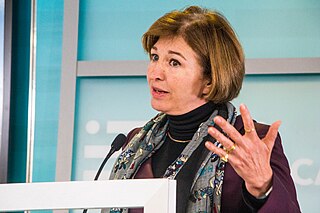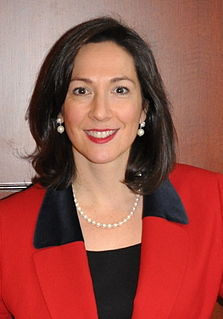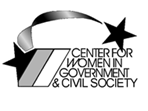
The State University of New York at Albany, commonly referred to as University at Albany, SUNY Albany or UAlbany, is a public research university with campuses in the New York cities of Albany and Rensselaer and the town of Guilderland. Founded in 1844, it is one of the "university centers" of the State University of New York (SUNY) system.

Gender equality, also known as sexual equality or equality of the sexes, is the state of equal ease of access to resources and opportunities regardless of gender, including economic participation and decision-making; and the state of valuing different behaviors, aspirations and needs equally, regardless of gender.
Jean Paulette Bethke Elshtain (1941–2013) was an American ethicist, political philosopher, and public intellectual. She was the Laura Spelman Rockefeller Professor of Social and Political Ethics in the University of Chicago Divinity School with a joint appointment in the department of political science.

Charlotte Bunch is an American feminist author and organizer in women's rights and human rights movements. Bunch is currently the founding director and senior scholar at the Center for Women's Global Leadership at Rutgers University in New Brunswick, New Jersey. She is also a distinguished professor in the Department of Women's and Gender Studies at Rutgers.
Education in Pakistan is overseen by the Federal Ministry of Education and the provincial governments, whereas the federal government mostly assists in curriculum development, accreditation and in the financing of research and development. Article 25-A of Constitution of Pakistan obligates the state to provide free and compulsory quality education to children of the age group 5 to 16 years. "The State shall provide free and compulsory education to all children of the age of five to sixteen years in such a manner as may be determined by law".
A. K. Shiva Kumar, is a development economist, policy advisor, and evaluator, who has over the past 40 years, taught economics, undertaken evaluations, conducted research and policy analysis, worked closely with governments, international agencies, and civil society organisations to advocate for changes in public policy and legislation. He teaches various courses at Harvard University, Indian School of Business, Young India Fellowship, S. P. Jain Institute of Management and Research and Ashoka University. He is a Board Member of the Global Partnership to End Violence against Children, Co-Chair of Know in Violence in Childhood, and a member of the Leadership Councils of both the International Center for Research on Women (ICRW) and Global Women's Institute, The George Washington University, Washington DC. In addition to serving as a senior policy adviser UNICEF – India (1992-2017), he was a member of India's National Advisory Council to the Prime Minister of India, constituted by the Chairperson Sonia Gandhi. The council was set up in June 2004 to oversee the implementation of India's National Common Minimum Programme.

Anne-Marie Slaughter is an American international lawyer, foreign policy analyst, political scientist and public commentator. From 2002 to 2009, she was the Dean of Princeton University's Woodrow Wilson School of Public and International Affairs and the Bert G. Kerstetter '66 University Professor of Politics and International Affairs. Slaughter was the first woman to serve as the Director of Policy Planning for the U.S. State Department from January 2009 until February 2011 under U.S. Secretary of State Hillary Clinton. She is a former president of the American Society of International Law and the current President and CEO of New America.

The Hubert H. Humphrey School of Public Affairs at the University of Minnesota is one of the United States' top-ranked professional public policy and planning schools. The school is noted for equipping students to play key roles in public life at the local, state, national, and global level and offers six distinctive master's degrees, a doctoral degree, and six certificate programs.

Kimberlé Williams Crenshaw is an American lawyer, civil rights advocate, philosopher, and a leading scholar of critical race theory. She is a full-time professor at the UCLA School of Law and Columbia Law School, where she specializes in race and gender issues. Crenshaw is also the founder of Columbia Law School's Center for Intersectionality and Social Policy Studies (CISPS) and the African American Policy Forum (AAPF), as well as the president of the Berlin-based Center for Intersectional Justice (CIJ).

Women in government refers to the history, demographics and participation of women in public offices. In many countries, women have had inadequate opportunities in social participation, especially in striving for political rights and power in the government and different institutions. This historical tendency still persists, although women are increasingly being elected to be heads of state and government.

The International Research & Exchanges Board (IREX) is an international, nonprofit organization that specializes in global education and development. IREX works with partners in more than 100 countries.
Stanford University has many centers and institutes dedicated to the study of various specific topics. These centers and institutes may be within a department, within a school but across departments, an independent laboratory, institute or center reporting directly to the Dean of Research and outside any school, or semi-independent of the University itself.

Alondra Nelson is an American writer and academic. An award-winning researcher, she is the Harold F. Linder Chair and Professor in the School of Social Science at the Institute for Advanced Study. She currently serves as Deputy Director for Science and Society in the White House Office of Science and Technology Policy. From 2017-2021, she was president of the Social Science Research Council. She was previously professor of sociology at Columbia University in the City of New York, where she served as the inaugural Dean of Social Science, as well as director of the Institute for Research on Women and Gender.
State feminism is feminism created or approved by the government of a state or nation. It usually specifies a particular program. The term was coined by Helga Hernes with particular reference to the situation in Norway, which had a tradition of government-supported liberal feminism dating back to the 1880s, and is often used when discussing the government-supported gender equality policies of the Nordic countries, that are linked to the Nordic model. The term has also been used in the context of developing countries where the government may prescribe its form of feminism and at the same time prohibit non-governmental organizations from advocating for any other feminist program. In this sense it is possible to distinguish between a liberal state feminism found in Western democracies such as the Nordic countries, and a somewhat more authoritarian state feminism that is often also linked to secularism, found e.g. in certain Middle Eastern countries.
Gender and development is an interdisciplinary field of research and applied study that implements a feminist approach to understanding and addressing the disparate impact that economic development and globalization have on people based upon their location, gender, class background, and other socio-political identities. A strictly economic approach to development views a country's development in quantitative terms such as job creation, inflation control, and high employment – all of which aim to improve the ‘economic wellbeing’ of a country and the subsequent quality of life for its people. In terms of economic development, quality of life is defined as access to necessary rights and resources including but not limited to quality education, medical facilities, affordable housing, clean environments, and low crime rate. Gender and development considers many of these same factors; however, gender and development emphasizes efforts towards understanding how multifaceted these issues are in the entangled context of culture, government, and globalization. Accounting for this need, gender and development implements ethnographic research, research that studies a specific culture or group of people by physically immersing the researcher into the environment and daily routine of those being studied, in order to comprehensively understand how development policy and practices affect the everyday life of targeted groups or areas.
Gender inequality in the United States has been diminishing throughout its history and significant advancements towards equality have been made beginning mostly in the early 1900s. However, despite this progress, gender inequality in the United States continues to persist in many forms, including the disparity in women's political representation and participation, occupational segregation, and the unequal distribution of household labor. The alleviation of gender inequality has been the goal of several major pieces of legislation since 1920 and continues to the present day. As of 2018, the World Economic Forum ranks the United States 51st in terms of gender equality out of 149 countries.

The David Bohnett Foundation is a global private foundation that gives grants to organizations that focus on its core giving areas – primarily Los Angeles area programs and LGBT rights in the United States, as well as leadership initiatives and voter education, gun violence prevention, and animal language research. As of 2020, the foundation has donated over $117 million to nonprofit organizations and initiatives.

Victoria A. Budson is the founding Executive Director of the Women and Public Policy Program (WAPPP) at the John F. Kennedy School of Government at Harvard University in Cambridge, Massachusetts. WAPPP closes gender gaps in economic opportunity, political participation, health and education by creating knowledge, training leaders and informing public policy and organizational practices. Budson founded and chairs "From Harvard Square to the Oval Office: A Political Campaign Practicum", a non-partisan initiative of the Women and Public Policy Program that provides a group of Harvard graduate students with the training and support they need to ascend in the electoral process at the local, state and national levels.
The term 'political participation' has a very wide meaning. It is not only related to 'Right to Vote', but simultaneously relates to participation in: decision-making process, political activism, political consciousness, etc. Women in India participate in voting, run for public offices and political parties at lower levels more than men. Political activism and voting are the strongest areas of women's political participation. To combat gender inequality in politics, the Indian Government has instituted reservations for seats in local governments.
Wanjiru Kamau-Rutenberg is the Director of African Women in Agricultural Research and Development (AWARD). Wanjiru is also the Founder and past Executive Director of Akili Dada, a leadership incubator for African girls and young women.











